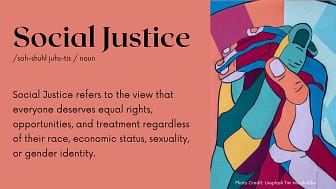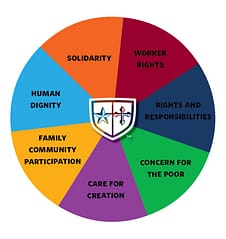Understanding Catholic Social Teaching: A Guide for Our College Community
 Catholic Social Teaching (CST) has deep roots in scripture, tradition, and centuries of Church thought. CST formally began with Pope Leo XIII’s encyclical, Rerum Novarum (“On the Condition of Labor”), issued in 1891. Responding to the injustices of the industrial revolution, that is, harsh working conditions, poverty, and economic disparity, the encyclical marked the beginning of the Church’s ongoing commitment to advocate for human dignity and justice in society.
Catholic Social Teaching (CST) has deep roots in scripture, tradition, and centuries of Church thought. CST formally began with Pope Leo XIII’s encyclical, Rerum Novarum (“On the Condition of Labor”), issued in 1891. Responding to the injustices of the industrial revolution, that is, harsh working conditions, poverty, and economic disparity, the encyclical marked the beginning of the Church’s ongoing commitment to advocate for human dignity and justice in society.
The Seven Core Principles of Catholic Social Teaching
Various popes, councils, and bishops have enriched CST, making it a dynamic response to modern social, economic, and political challenges. The Catholic bishops of the United States captured Catholic Social Teaching in seven principles of Catholic social justice, drawing from the Bible and the long tradition of Catholic thought over the centuries as well as more contemporary encyclicals and documents promulgated by the papacy and the Second Vatican Council.
- Life and Dignity of the Human Person: Every human life is sacred, and the dignity of the human person is the foundation of a moral vision for society.
- Call to Family, Community, and Participation: Human beings grow and achieve fulfillment in community; thus, society must support and strengthen family life and ensure everyone’s participation in social, economic, and political life.
- Rights and Responsibilities: Every person has a fundamental right to life and dignity, as well as responsibilities to others and society.
- Option for the Poor and Vulnerable: A basic moral test for society is how its most vulnerable members are faring, and we must prioritize their needs.
- The Dignity of Work and the Rights of Workers: Work is more than a livelihood; it is a form of participation in God’s creation. Workers’ rights must be protected.
- Solidarity: We are all one human family, regardless of differences, and must pursue justice and peace collectively.
- Care for God’s Creation: We have a responsibility to protect the planet and ensure its sustainability for future generations.
Compatibility of CST with Diversity, Equity, and Inclusion (DEI)

Why CST Matters at Saint Michael’s College
As a Catholic college, our community is inspired by Catholic Social Teaching to foster a culture of respect, social justice, and active engagement with the world’s pressing challenges for all people. By living out these principles, we fulfill our mission to educate students who are not only academically proficient but morally committed to building a more just, equitable, and compassionate world for all.
If you would like to comment or ask a question, I can be reached at dtheroux@smcvt.edu. Please note also that Vernita Weller and I will be presenting to the college community our reflections on Diversity, Equity, and Inclusion in relationship to Catholic Social Thought at two future dates. Please be on the look-out for announcements about these presentations. Let’s talk.






